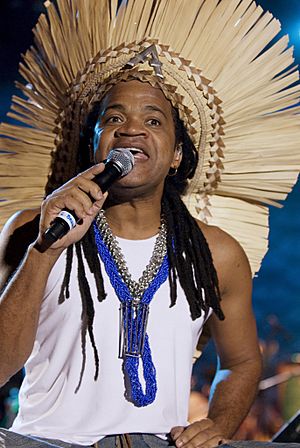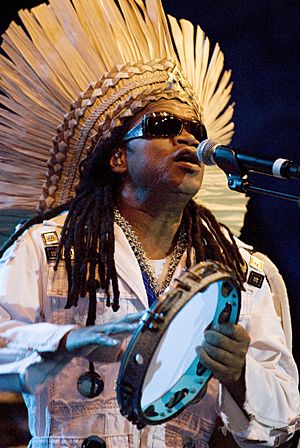Carlinhos Brown facts for kids
Quick facts for kids
Carlinhos Brown
|
|
|---|---|
 |
|
| Background information | |
| Birth name | Antônio Carlos Santos de Freitas |
| Born | 23 November 1962 Salvador, Bahia, Brazil |
| Genres | Funk, latin music, R&B, soul music, samba, batucada, reggae, Axe music, MPB |
| Occupation(s) | Singer, musician |
| Associated acts | Timbalada, Tribalistas, Sergio Mendes |
Antônio Carlos Santos de Freitas, known as Carlinhos Brown (born November 23, 1962), is a famous Brazilian singer, percussionist, and music producer. He comes from Salvador, Bahia, Brazil. His music mixes different styles like funk, Latin music, R&B, soul, reggae, and traditional Brazilian percussion sounds.
Carlinhos Brown has won many awards for his music. In 2012, his song "Real in Rio" was nominated for an Oscar. This song was part of the movie Rio. He has also won a Goya Award and two Latin Grammys. He was nominated for Latin Grammys 8 times. He also received an award for his work as an art educator from the International Society of Musical Education (ISME).
Contents
Early Life and Music Beginnings
Carlinhos Brown was born in Candeal Pequeno, a neighborhood in Salvador da Bahia, Brazil. His parents were Renato and Madalena. When he was a child, two musicians from Bahia, Caetano Veloso and Gilberto Gil, started a new music style called Tropicália. This style changed Brazilian music a lot.
A person named Osvaldo Alves da Silva helped Carlinhos learn about Brazilian folklore. As he grew up, Carlinhos learned to play many different percussion instruments.
Musical Journey
Starting Out in Music
In the 1980s, Carlinhos Brown began working with other artists. In 1984, he played with Luís Caldas's band, Accordes Verdes. This band helped create a music style called samba-reggae. In 1985, Luís Caldas recorded "Visão de Cíclope," a song written by Carlinhos Brown. It became very popular in Salvador.
After this, Carlinhos wrote more songs for other artists. In 1989, he joined Caetano Veloso's band for the album Estrangeiro. He wrote a successful song called "Meia Lua Inteira." This song won him an important music award in Bahía, the Caymmi trophy. It also led him to tour the world with famous musicians like João Gilberto, Djavan, and João Bosco.
Timbalada Group
In the late 1980s, Carlinhos Brown started bringing people together in his hometown to play percussion. He taught them basic rhythms. The people in Candeal had strong connections to Candomblé, a religion from Africa that involves a lot of drumming. Carlinhos saw this rich culture as a chance for growth.
These gatherings grew into a band called Timbalada. Another band he formed, Vai Quem Vem, also became very popular. They became so famous that Carlinhos had to build a concert stadium for their practices! Timbalada recorded eight albums and toured many countries. Billboard magazine called their first album the "best record produced in Latin America in 1993." Much of the money they earned helped improve the streets and houses in Candeal.
In 1992, Carlinhos Brown worked on the album Ritual Beating System with the Bahia Black project. He also wrote and performed songs for Sergio Mendes's album Brasileiro in 1992. These songs included "Fanfarra," "Magalenha," and "Indiado."
Solo Career Highlights
After Timbalada's success, Carlinhos Brown released his first solo album in 1996. It was called Alfagamabetizado. On this album, he sang, wrote songs, and played instruments. That same year, he also appeared on the album Roots by the Brazilian metal band Sepultura.
In 1997, Carlinhos Brown performed his song "A Namorada" in the American movie Speed 2: Cruise Control. He also appeared in a Brazilian movie called Navalha na Carne. In 1998, he worked with Bonga and Marisa Monte on a song for a charity album called Onda Sonora: Red Hot + Lisbon.
His second album, Omelete Man, came out in 1998. His third album, Bahia do Mundo, Mito e Verdade, followed in 2001.
In 2001, Carlinhos Brown performed at the Rock in Rio festival. The audience, mostly fans of other bands, was not very welcoming. During his show, some concertgoers threw water bottles at him.
He released Carlinhos Brown É Carlito Marrón in 2003. In 2004, he worked with DJ Dero on the album Candyall Beat. The Carlito Marrón album was very successful in Spain. It included a hit song called "Maria Caipirinha."
Carlinhos Brown is still very active in his community in Salvador da Bahía. In 1994, he started the Pracatum Music School in the Candeal neighborhood. This non-profit organization helps with education, culture, and community projects. He also has his own music label, Candyall Records. Carlinhos Brown has also started painting, and his artwork has been well received.
On April 10, 2007, his album A Gente Ainda Não Sonhou was released. He wrote two songs on this album with Marisa Monte and Arnaldo Antunes.
Carlinhos Brown is featured a lot in the 2004 documentary El Milagro de Candeal. This movie shows how Carlinhos has influenced and changed Candeal. What was once a difficult area is now known as a colorful music town.
In 2011, he worked with Los Van Van on a song for a charity album called Red Hot + Rio 2. This album helps raise money and awareness to fight AIDS/HIV. More recently, he was featured in Shakira's song "LA LA LA." This song was part of the 2014 World Cup in Rio.
From 2012 to 2023, Carlinhos Brown was a judge on The Voice Brasil, a reality talent show. He was a judge for nine years in a row. He has also been a judge on The Voice Kids for eight seasons.
Tribalistas Group
In 2002, Carlinhos Brown formed a group called Tribalistas. He formed it with Arnaldo Antunes and Marisa Monte. He sang and played drums on their album, Os Tribalistas. Their song "Já Sei Namorar" became the number-one song on Brazilian radio. Their second song, "Velha Infância," was also very popular. The album had two more hits in Brazil: "Passe em Casa" and "É Você." In 2003, Tribalistas won awards for Best Album, Best DVD, and Best Song (for "Já Sei Namorar").
Helping His Community
Carlinhos Brown started the Pracatum School, also known as the Pracatum Project, in 1994. After becoming famous, he wanted to do more than just write songs. He wanted to help his hometown and the children there, who, like him, had big dreams but few resources. The money from this school and from Timbalada helped improve health services and urban development. This included paving streets that once had overflowing sewer water and fixing unfinished housing projects.
Family Life
Carlinhos Brown has a daughter named Nina De Freitas, born in 1990, with Raquel Machado. He is currently married to Helena Buarque. They have four children together: Francisco (born 1996), Clara (born 1998), Cecília (born 2006), and Leila (born 2009). He also has a son named Miguel (born 1997) from another relationship.
Music Albums
- 1996 Alfagamabetizado
- 1998 Omelete Man
- 2001 Bahia do Mundo, Mito e Verdade
- 2003 Carlinhos Brown é Carlito Marrón
- 2004 Candyall Beat
- 2007 A Gente Ainda Não Sonhou
- 2010 Adobró
- 2010 Diminuto
- 2012 Mixturada Brasileira
- 2014 Marabó
- 2014 Vibraaasil
- 2015 Sarau du Brown
- 2016 ‘’Artefireaccua’’
- 2017 ‘’Semelhantes’’
- 2020 ‘’Axé Inventions’’
- 2020 ‘’Umbalista’’
- 2020 ‘’Carlinhos Brown Kids e Paxuá e Paramim’’
- 2022 ‘’Sim.Zas’’
- 2022 ‘’ElectroTribalistas’’
- 2023 ‘’Pop Xiré’’
Awards and Nominations
| Year | Awards | Category | Recipient | Outcome |
|---|---|---|---|---|
| 2001 | Latin Grammy | Best Brazilian Song | Amor I Love You performed by Marisa Monte | Nominated |
| 2003 | Latin Grammy | Best Brazilian Contemporary Pop Album | Tribalistas | Won |
| Latin Grammy | Best Brazilian Song | Já Sei Namorar performed by Tribalistas | Nominated | |
| 2004 | Latin Grammy | Best Brazilian Contemporary Pop Album | Carlinhos Brown Es Carlito Marrón | Won |
| 2006 | Latin Grammy | Best Brazilian Song | O Bonde do Dom performed by Marisa Monte | Nominated |
| 2007 | Latin Grammy | Best Brazilian Contemporary Pop Album | A Gente Ainda Não Sonhou | Nominated |
| 2012 | Academy Awards | Best Original Song | Real in Rio | Nominated |
| Annie Awards | Music in a Feature Production | Rio | Nominated | |
| Black Reel Awards | Best Original or Adapted Song | Fly Love | Nominated |
Carlinhos Brown also received a Prince Claus Award in 2003. This award recognized his work in "The Survival and Innovation of Crafts."
See also
 In Spanish: Carlinhos Brown para niños
In Spanish: Carlinhos Brown para niños
 | DeHart Hubbard |
 | Wilma Rudolph |
 | Jesse Owens |
 | Jackie Joyner-Kersee |
 | Major Taylor |


